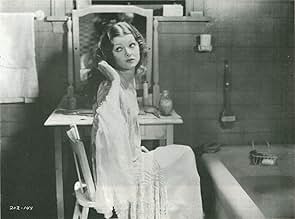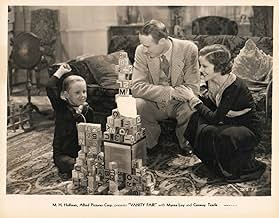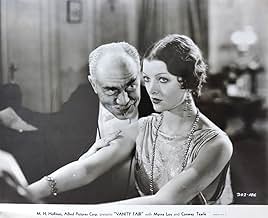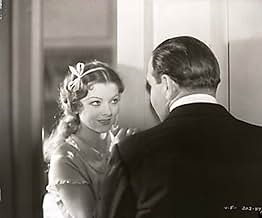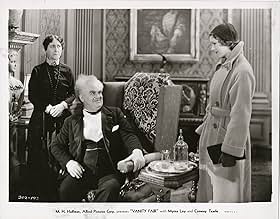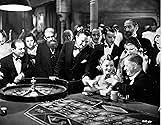Aggiungi una trama nella tua linguaThis cinematic adaptation of William Makepeace Thackeray's novel stars Myrna Loy in her first starring role.This cinematic adaptation of William Makepeace Thackeray's novel stars Myrna Loy in her first starring role.This cinematic adaptation of William Makepeace Thackeray's novel stars Myrna Loy in her first starring role.
- Regia
- Sceneggiatura
- Star
Ray Culley
- Casino patron
- (non citato nei titoli originali)
Bill Elliott
- Minor Role
- (non citato nei titoli originali)
Tom Ricketts
- Sir Pitt's Butler Parker
- (non citato nei titoli originali)
Recensioni in evidenza
When I first turned on the DVD with this film, I was very tempted to just turn it off--the print and especially the sound were that bad. In fact, it's among the worst quality prints I've ever seen from Alpha Video--and that's saying a lot because none of Alpha's DVDs appear to have any restoration work on them and many are in horrible shape. The sound on this one is simply appallingly bad and I sure hope someone would one day restore the print. But, considering this isn't a particularly good film, it's doubtful this will occur.
Aside from the novelty of seeing this story of a conniving woman set in the modern day instead of the 19th century like it was in Thackeray's novel as well as seeing Myrna Loy in one of her earliest starring roles, there's not much to recommend this movie. While I did not exactly love the famous 1935 version (entitled "Becky Sharp"--and it was the first full-length full color movie), it was better than this one. There are also newer versions that also work better than this low-budget 1932 one. In fact, I really think they set the film in the 1930s because of the budget--as they didn't need the added expense of costumes and wigs. This one, unfortunately, comes off as dated and creaky--with poor acting and a cheapness about it. And, given the horrendous quality of the print, it is not a film I could recommend.
Aside from the novelty of seeing this story of a conniving woman set in the modern day instead of the 19th century like it was in Thackeray's novel as well as seeing Myrna Loy in one of her earliest starring roles, there's not much to recommend this movie. While I did not exactly love the famous 1935 version (entitled "Becky Sharp"--and it was the first full-length full color movie), it was better than this one. There are also newer versions that also work better than this low-budget 1932 one. In fact, I really think they set the film in the 1930s because of the budget--as they didn't need the added expense of costumes and wigs. This one, unfortunately, comes off as dated and creaky--with poor acting and a cheapness about it. And, given the horrendous quality of the print, it is not a film I could recommend.
You know I'm willing to bet that Myrna Loy was excited that she would get to do a film version of Thackery's Vanity Fair. But she lost her enthusiasm upon finding it was for a poverty row outfit called Allied Pictures. God only knows whether Louis B. Mayer owed something to producer Chester Franklin or Myrna Loy committed some transgression that caused her to be punished.
With the usual MGM productions values and had they kept it in the mid Victorian era it was written, Vanity Fair might have turned out to be a classic film. But it was a poverty row production set during the Jazz Age of the 20s. Where in the United Kingdom it wasn't all that different from us except they were smart enough not to put in Prohibition.
Barbara Kent brings school girl chum Myrna Loy home for the holidays. Myrna is an orphan who once she tastes some of the good life that Kent's family enjoys she's going to have it whatever the cost. The film is a lot like the Barbara Stanwyck classic Baby Face except Baby Face is far less pretentious.
Thackery's writing was of Victorian times and it just didn't make sense for the Roaring 20s. Myrna had a lost look and I'm sure she was grateful to finish the film and get back to MGM.
What could she have done to deserve this?
With the usual MGM productions values and had they kept it in the mid Victorian era it was written, Vanity Fair might have turned out to be a classic film. But it was a poverty row production set during the Jazz Age of the 20s. Where in the United Kingdom it wasn't all that different from us except they were smart enough not to put in Prohibition.
Barbara Kent brings school girl chum Myrna Loy home for the holidays. Myrna is an orphan who once she tastes some of the good life that Kent's family enjoys she's going to have it whatever the cost. The film is a lot like the Barbara Stanwyck classic Baby Face except Baby Face is far less pretentious.
Thackery's writing was of Victorian times and it just didn't make sense for the Roaring 20s. Myrna had a lost look and I'm sure she was grateful to finish the film and get back to MGM.
What could she have done to deserve this?
Rather affecting little morality flick adapted from the classic novel of same name. Wow, Becky Sharp is one sharp looking cookie. As Becky, Loy turns every rich guys head into a hormonal surge. Trouble is she's got no moral principles that might guide her into something other than a mercenary direction. As a result, she looks to fleece potential suitors just for her own benefit. Still, she's having trouble sorting through the wealthy pursuers, who are a crowded lot. At the same time, her mis-judgements and maybe cosmic fate keep getting in the way.
Loy's perfect in her first starring role, big eyed, statuesque, and nicely modulated in her coyness. In fact, it cleverly takes a while to figure out she really is a gold-digger and not just an attention-getter. Then too, I love the way she never answers a bedroom door except in her robe-less nightgown. No wonder the guys keep coming. But Loy's real performance triumph is not making Becky dislikable despite her unremitting selfishness. To me, that helps make the movie watchable. But don't look to the storyline for action or real suspense. Rather, the plot hinges on character and what the goldigger's outcome will be. Then too, I found the climax rather surprising, but then it is 1932 while censorship is still two-years away.
Anyway, for fans of Loy, it's a showcase, while for movie fans, the 60-minutes is surprisingly contemporary in its dealings.
Loy's perfect in her first starring role, big eyed, statuesque, and nicely modulated in her coyness. In fact, it cleverly takes a while to figure out she really is a gold-digger and not just an attention-getter. Then too, I love the way she never answers a bedroom door except in her robe-less nightgown. No wonder the guys keep coming. But Loy's real performance triumph is not making Becky dislikable despite her unremitting selfishness. To me, that helps make the movie watchable. But don't look to the storyline for action or real suspense. Rather, the plot hinges on character and what the goldigger's outcome will be. Then too, I found the climax rather surprising, but then it is 1932 while censorship is still two-years away.
Anyway, for fans of Loy, it's a showcase, while for movie fans, the 60-minutes is surprisingly contemporary in its dealings.
I bought this DVD as part of a set of 50 "historic classics." It's hardly a classic, and as the plot was updated to the time of its release, is not historic either. The actual title on the DVD is "Indecent," and additionally subtitled "The Private Life of Becky Sharp." Myrna Loy is not very convincing, although in her defense she is saddled with an awful script and trite dialogue. As with many early talkies, and especially ones made by smaller studios, there is little skill demonstrated by the cast and crew. Loy does wear a few gowns that are quite stylish, but her costumes and make-up in the later scenes are overdone. The one saving grace is a tolerable performance by Billy Bevan, who plays one of her many suitors
VANITY FAIR (Allied Pictures, 1932), directed by Chester Franklin, is labeled in the opening credits as "a modern dress adaptation to BECKY SHARP by William Thackeray." With classic literature transformed to the screen dating back to the silent film era, VANITY FAIR, being one of them in 1915 and 1923, marks the first sound edition to the classic novel, bringing forth the unlikely candidate of the youthful Myrna Loy (courtesy of Metro-Goldwyn-Mayer) in this "poverty-row" production. Somewhat miscast in some respects, Loy managed to rise above material regardless of her softer appeal to such better suited actresses as British born actress, Heather Angel, for example, who might have made adventuress Becky Sharp a bit acceptable in character portrait.
In a limousine bound for London, Amelia Sedley (Barbara Kent), a rich college girl, accompanied by her best friend and classmate, Becky Sharp (Myrna Loy). Having no family of her own, Becky is invited to spend Christmas with Amelia and her family. After making the acquaintance with her parents, George (Herbert Bunston) and Rita Sedley (Mary Forbes), Becky is introduced to Amelia's brother, Joseph (Billy Bevan), having just arrived from his trip in India. Regardless of his overweight, Becky takes a fancy to him. After inviting Becky to spend the weekend with him in Brighton, Becky "accepts" this as a wedding proposal, thus scaring Joseph off to Scotland, leaving Becky a farewell note through Amelia. With Joseph out of the way, Becky takes an interest in Amelia's fiance, George Osborne (Walter Byron). Seeing them alone together has Mrs. Sedley advising Becky to leave. Accepting a position as governess to the two daughters of Sir Pitt Crawley (Lionel Bellmore), amiddle-aged man whose wife has been deadly ill for ten years. Sir Pitt comes on to Becky, though she shows more interest in Pitt's sophisticated adult son, Rawdon (Conway Tearle) instead. After Pitt's wife dies, he goes quickly to Becky to propose, only to discover she has married his son instead. Angry and bitter, Pitt leaves Rawdon penniless and orders the couple out of his home. On their own, Becky and Rawdon struggle financially, avoiding debt collectors, and cheating at card games to acquire extra money. After Amelia's husband, George, who Becky has been seeing secretly, dies in a fox hunting accident, Amelia begins her new relationship with Dobbins (Anthony Bushnell), her former beau. Having served time in prison, Rawdon returns home to find Becky alone with the Marquis of Steyne (Montagu Love). Learning he's been supporting her financially with expensive jewelry, Rawdon orders Becky out of his life. Living in Paris, Becky meets with one of her former suitors at the gambling casino, only to later see herself the way others have been for years. Others in the cast include Lilyan Irene (Polly), Tom Ricketts (Parker, the Butler), and Elspeth Dudgeon (The Housekeeper).
In spite of its slow packing and visuals that make VANITY FAIR look more like an early 1929 talkie, the film is made interesting through the presence of Myrna Loy. How she got this assignment to appear in an independent production as Becky Sharp remains a mystery. Though Loy starts off by speaking in British accept early in the story, this is soon abandoned for more natural speaking flair. Except for a couple of scenes, VANITY FAIR lacks background scoring. With other classic literature turned motion pictures by minor studios as Monogram's OLIVER TWIST (1933) and JANE EYRE (1934), major studios soon got into the act with Charles Dickens' GREAT EXPECTATIONS (Universal, 1934) and DAVID COPPERFIELD (MGM, 1935) before RKO Radio revamped VANITY FAIR three years later as BECKY SHARP (1935) starring Miriam Hopkins. Aside from resuming the original Thackeray story back to 19th Century England, BECKY SHARP went a step further as being produced in the newly formed three-strip Technicolor. Even with some dull stretches and not being a scene-by-scene remake, BECKY SHARP (1935) definitely was an improvement over VANITY FAIR (1932).
Virtually forgotten and out of television circulation since the 1950s, VANITY FAIR has come out of oblivion through its distribution decades later on home video, DVD and TCM cable television (TCM premiere: April 4, 2025). Initially clocked at 73 minutes, beware of shorter 67-minute DVD editions using a new opening that reads: Screen Craft Pictures Present "INDECENT: THE PRIVATE LIFE OF BECKY SHARP" starring Myrna Loy. Following this 1932 production, Loy returned to MGM, where she truly belonged. (**)
In a limousine bound for London, Amelia Sedley (Barbara Kent), a rich college girl, accompanied by her best friend and classmate, Becky Sharp (Myrna Loy). Having no family of her own, Becky is invited to spend Christmas with Amelia and her family. After making the acquaintance with her parents, George (Herbert Bunston) and Rita Sedley (Mary Forbes), Becky is introduced to Amelia's brother, Joseph (Billy Bevan), having just arrived from his trip in India. Regardless of his overweight, Becky takes a fancy to him. After inviting Becky to spend the weekend with him in Brighton, Becky "accepts" this as a wedding proposal, thus scaring Joseph off to Scotland, leaving Becky a farewell note through Amelia. With Joseph out of the way, Becky takes an interest in Amelia's fiance, George Osborne (Walter Byron). Seeing them alone together has Mrs. Sedley advising Becky to leave. Accepting a position as governess to the two daughters of Sir Pitt Crawley (Lionel Bellmore), amiddle-aged man whose wife has been deadly ill for ten years. Sir Pitt comes on to Becky, though she shows more interest in Pitt's sophisticated adult son, Rawdon (Conway Tearle) instead. After Pitt's wife dies, he goes quickly to Becky to propose, only to discover she has married his son instead. Angry and bitter, Pitt leaves Rawdon penniless and orders the couple out of his home. On their own, Becky and Rawdon struggle financially, avoiding debt collectors, and cheating at card games to acquire extra money. After Amelia's husband, George, who Becky has been seeing secretly, dies in a fox hunting accident, Amelia begins her new relationship with Dobbins (Anthony Bushnell), her former beau. Having served time in prison, Rawdon returns home to find Becky alone with the Marquis of Steyne (Montagu Love). Learning he's been supporting her financially with expensive jewelry, Rawdon orders Becky out of his life. Living in Paris, Becky meets with one of her former suitors at the gambling casino, only to later see herself the way others have been for years. Others in the cast include Lilyan Irene (Polly), Tom Ricketts (Parker, the Butler), and Elspeth Dudgeon (The Housekeeper).
In spite of its slow packing and visuals that make VANITY FAIR look more like an early 1929 talkie, the film is made interesting through the presence of Myrna Loy. How she got this assignment to appear in an independent production as Becky Sharp remains a mystery. Though Loy starts off by speaking in British accept early in the story, this is soon abandoned for more natural speaking flair. Except for a couple of scenes, VANITY FAIR lacks background scoring. With other classic literature turned motion pictures by minor studios as Monogram's OLIVER TWIST (1933) and JANE EYRE (1934), major studios soon got into the act with Charles Dickens' GREAT EXPECTATIONS (Universal, 1934) and DAVID COPPERFIELD (MGM, 1935) before RKO Radio revamped VANITY FAIR three years later as BECKY SHARP (1935) starring Miriam Hopkins. Aside from resuming the original Thackeray story back to 19th Century England, BECKY SHARP went a step further as being produced in the newly formed three-strip Technicolor. Even with some dull stretches and not being a scene-by-scene remake, BECKY SHARP (1935) definitely was an improvement over VANITY FAIR (1932).
Virtually forgotten and out of television circulation since the 1950s, VANITY FAIR has come out of oblivion through its distribution decades later on home video, DVD and TCM cable television (TCM premiere: April 4, 2025). Initially clocked at 73 minutes, beware of shorter 67-minute DVD editions using a new opening that reads: Screen Craft Pictures Present "INDECENT: THE PRIVATE LIFE OF BECKY SHARP" starring Myrna Loy. Following this 1932 production, Loy returned to MGM, where she truly belonged. (**)
Lo sapevi?
- QuizShot in ten days.
- Citazioni
Joseph Sedley: Ever been to Brighton?
Becky Sharp: Brighton? No, never.
Joseph Sedley: How would you like to come with me for a weekend?
[lecherous wink]
Joseph Sedley: Lovely place. Lots of fun. Lots of champagne.
- ConnessioniReferenced in Hollywood Hist-o-Rama: Myrna Loy (1961)
I più visti
Accedi per valutare e creare un elenco di titoli salvati per ottenere consigli personalizzati
Dettagli
- Tempo di esecuzione1 ora 18 minuti
- Colore
- Proporzioni
- 1.37 : 1
Contribuisci a questa pagina
Suggerisci una modifica o aggiungi i contenuti mancanti

